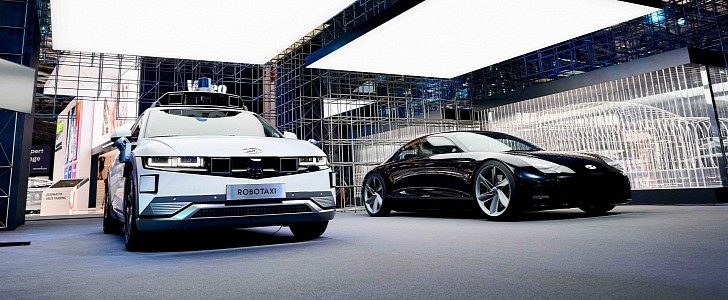Hyundai has announced its commitment to achieving carbon neutrality by 2045 at the 2021 IAA Mobility event in Germany. The brand will focus its efforts on green energy, clean mobility, and next-generation platforms in the next few years. But what does that mean for you?
First off all, Hyundai will stop selling vehicles with internal combustion engines in Europe in 2035. The company has not specified when and if it will stop selling internal combustion-engined vehicles altogether. We are fourteen years away from that moment, so there is no point to try and figure out what models will get the cut and when, but it is evident that they will all go away in 2035.
However, Hyundai Motor wants to reduce its carbon emissions 75 percent below 2019 levels by 2040. Five years later, the company wants full carbon neutrality on its production and global operations. That does mean that most, if not all of their ICE vehicles will be cut from the range by 2045.
The IAA 2021 Mobility show will bring an all-electric robotaxi to Hyundai's exhibition space, an upcoming electric model in concept form, as well as artistic displays meant to underline the value of hydrogen in carbon-neutral solutions.
By 2030, Hyundai wants to have 30 percent of its global sales composed of zero-emission vehicles. In ten years' time from that moment, Hyundai wishes to have 80 percent of its sales composed of battery electric vehicles, fuel cell electric vehicles, and other zero-emission vehicles.
Hyundai's first robotaxi will be based on the Ioniq 5, which will come with SAE Level 4 autonomous driving through the company's collaboration with Motional. The exhibit shown at IAA 2021 will be a concept, but Motional will help Hyundai launch a fully driverless service in 2023.
At the same time, Hyundai is developing solutions to make more green hydrogen, as well as reducing carbon dioxide emissions at its sites and in its operations. The latter is especially difficult since it involves third-party companies that also must adhere to Hyundai's requirements.
Used batteries of electric vehicles will be employed in energy storage systems, and Hyundai has already prepared a program called Second Life Battery Energy Storage System.
Other automakers have devised similar plans involving reusing electric vehicles' batteries into grid support systems. The latter setup can also be used by prosumers, a term that refers to those who have solar panels on their homes and can sell excess electricity to the supplier that owns the grid.
However, Hyundai Motor wants to reduce its carbon emissions 75 percent below 2019 levels by 2040. Five years later, the company wants full carbon neutrality on its production and global operations. That does mean that most, if not all of their ICE vehicles will be cut from the range by 2045.
The IAA 2021 Mobility show will bring an all-electric robotaxi to Hyundai's exhibition space, an upcoming electric model in concept form, as well as artistic displays meant to underline the value of hydrogen in carbon-neutral solutions.
By 2030, Hyundai wants to have 30 percent of its global sales composed of zero-emission vehicles. In ten years' time from that moment, Hyundai wishes to have 80 percent of its sales composed of battery electric vehicles, fuel cell electric vehicles, and other zero-emission vehicles.
Hyundai's first robotaxi will be based on the Ioniq 5, which will come with SAE Level 4 autonomous driving through the company's collaboration with Motional. The exhibit shown at IAA 2021 will be a concept, but Motional will help Hyundai launch a fully driverless service in 2023.
At the same time, Hyundai is developing solutions to make more green hydrogen, as well as reducing carbon dioxide emissions at its sites and in its operations. The latter is especially difficult since it involves third-party companies that also must adhere to Hyundai's requirements.
Used batteries of electric vehicles will be employed in energy storage systems, and Hyundai has already prepared a program called Second Life Battery Energy Storage System.
Other automakers have devised similar plans involving reusing electric vehicles' batteries into grid support systems. The latter setup can also be used by prosumers, a term that refers to those who have solar panels on their homes and can sell excess electricity to the supplier that owns the grid.






